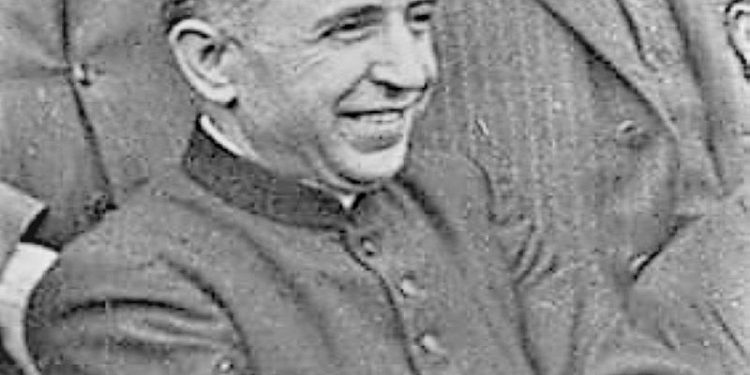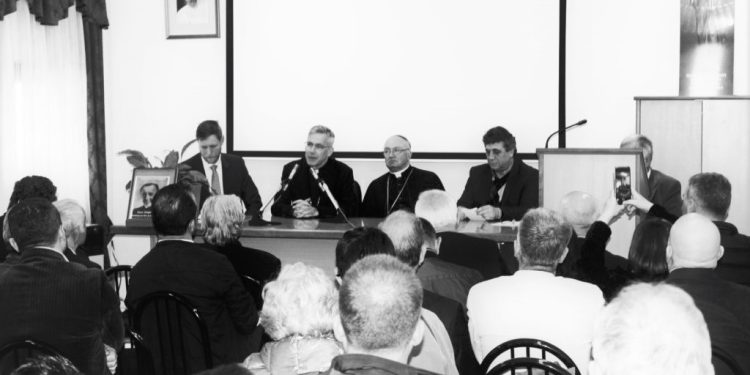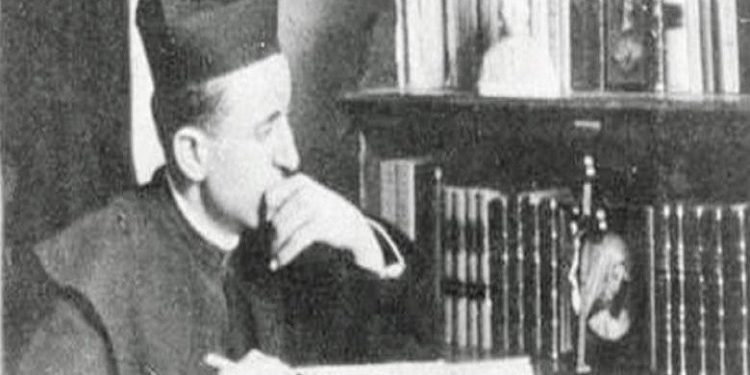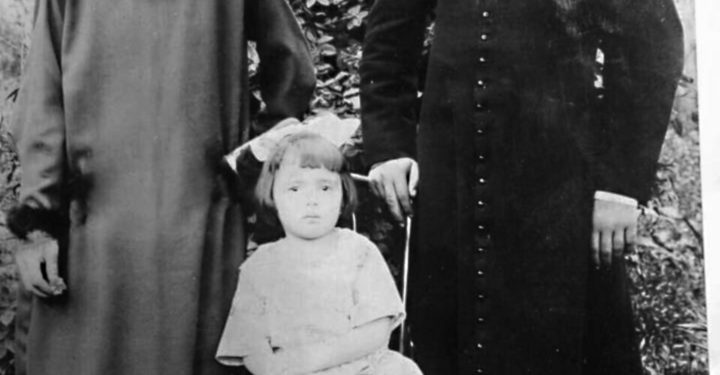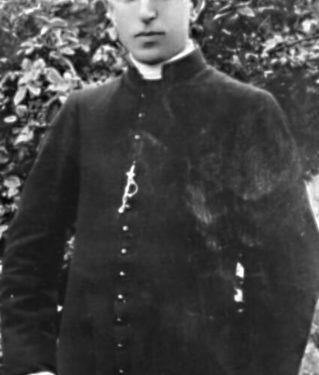NIKOLLË LOKA
Av. ALFDRED DUKA
NIKOLIN KURTI
The seventh part
WHY DOES THE POLITICAL ACCUSATION OF COLLABORATION NOT STAND?
-Continuing the tradition of native Catholic clergy –
Memorie.al/ Among the first measures taken against religion was the ban on religious education of the young generation in schools. In 1945, due to international circumstances, the communist state did not issue any law on this, but quietly tried to prevent religion from being taught in schools. This action was contrary to the law in force. In those conditions, the state authorities were not able to prohibit the teaching of religion, in cases where it was requested. In the letter that cleric Kurti sends to the Ministry of Justice, he reminds them that “until the siege of Tirana”, i.e., before the liberation of the country, the subject of faith was given and then, i.e., after the liberation, despite repeated requests, it was prevented. Kurti does not do this parallelism by chance, but to remind the authorities that they cannot and should not deprive people of some rights that they had before.
Tirana 13.III.1945
Parish Office of the Catholic Church
Tirana, Pr. No. 92/45
Pt. Tirana Ministry of Justice
Until the siege of Tirana, religious teachers were charged by the Ministry of Education with giving religious lessons in all the schools of the city.
From that day until today, although we have insisted on more than one occasion at the Education Inspectorate, we have not been allowed to continue in our various duties.
We ask the High Dicastery to intercede with the Ministry of Education, because this is also in the interest of the people, so that the teachers of the Faith can be taken back into their service as soon as possible.
The parish priests
President of the Catholic Community of Tirana
The answer came after a month, when the Government held a meeting where the problem of education was discussed and did not make any decision to ban the subject of faith. Therefore, on April 17, 1945, a letter from the Education Section of the City of Tirana was addressed to the Catholic Community, according to which the teaching of religion in schools was allowed.
The Presidency of the Council NC.CL
E/N Tirana Prefecture
Education Section no. 85
Death to Fascism
Freedom to the People
Tirana, 17.IV.45
Catholic Committee
Tirana
Based on a letter from the Minister of Education, we are authorized to start religious lessons in the schools of the city as they have been developed before, i.e. 1 lesson per week for all those who wish to follow these lessons. In this case, you are instructed that the teaching of religion takes place only among State schools.
So, suggest us the teachers who will conduct these lessons and send us a copy of the books that you can eventually use for these lessons. The teachers will be paid by the Executive Committee of N/prefecture based on the hours worked.
City Education Officer
Muharrem Pirdeni
And the answer was quick. Don Shtjefni appoints a teacher of the faith, Don Frano Illina, and as teaching texts he sends the Catechism of Pius X “by Leon Nigris” and “Spejt dile” by Father Harap.
Apparently, the subject of faith continued in the new school year 1945-1946, according to Dom Shtjefni, with the letter No. 314/45 addressed to the Ministry of Justice, where he sends them as teachers of the Catholic faith for the schools of the capital Dom Anton Zogajn and himself. On November 23, 1945, the Ministry of Education with letter No. 181/110 notified the Education Section of the Subprefecture of Tirana: “For the school year 1945-1946, Don Anton Zogaj and Don Shtjefën Kurti. Their remuneration has been determined based on the hours they will provide”.
The decision was sent to the Parish of Tirana for notification and action. In addition to closing the schools and kindergartens maintained by the Catholic Church, the state was also confiscating their furniture and teaching tools, sometimes by order and sometimes indirectly, allegedly as a loan to be returned later.
Based on the order of the Ministry of Social Assistance, this Committee is opening kindergartens in all neighborhoods of Tirana, in order to gather all the children, especially those from the poor, to give them the necessary education, and free from the dangers of the roads.
Taking into account that, as far as the new neighborhood is concerned, we lack children’s benches, as well as their chairs, due to the fact that all the necessary furniture ordered for all the kindergartens will be delivered to us at the beginning of next spring, please have the kindness to arrange for the benches to be taken to us as well as the corresponding chairs of the Infant Asylum of that Parish, which are located near the Servite Sisters, based in the “Conference of Peza” promenade. The banks in the object, this Committee requests in foreign form, you undertake to return them to the Parish in the condition they are handed over today”.[1]
To keep the Church as a cultural institution
The state could not allow religious communities to create their own cultural circles in the bosom of society, even more so in the case of the Catholic Church, which was seen as a strong opponent of the socialist society, therefore it would limit the activity of circles operating near Catholic Church and then would eventually close them. In addition to education, the central axis of atheist-communist education, literature, cinematography, art and theater also served as levers of this education. Novels, stories, novellas, films talked about negative and destructive characters, who came from families of kulaks, declassified or religious, who were not in harmony with the new socialist reality.
They were clothed with the most negative qualities of human nature and presented as incorrigible medievalists. Stigmatization gave the sarcasm of these layers unacceptable to the new society, aimed at instilling hatred against the beliefs and ideas they represented and not just against people. The films, on the other hand, would portray the figures of the clergy as people connected to the feudal-bourgeois regime that exploited the people until the last drop of blood. They would portray them as figures who had always worked against the national cause, as morally degenerate, full of other bad vices. What must be understood is that a distinction must be made between the principles and the acts that are carried out in the name of these same principles, but with a completely different purpose. We cannot demonize a whole system of principles, a whole system of values, because of the abusers of these principles, who realize their own goals.
The negatively portrayed figure of the clergy had as its antipode the figure of the communist intellectual, the worker and the simple peasant, imbued with the teachings of the party, who fights human evil and natural evils armed with scientific materialism. This character, characterized by these qualities in his innocence, reflecting the communist morality, is well-defined to be victorious, because he was educated and inspired by the infallible teachings of the party and not by the teachings of religious beliefs.
As the days went by, the cultural activity of the church had also decreased considerably. The church no longer had the necessary spaces. Cultural initiatives were viewed with suspicion and those who participated in them were persecuted. However, for some time, the traditional practice of seeking permission for cultural activities continued and that permission, in some cases, was granted. When the imprisonments, the trials against the clerics, the derogatory writings against their activities began, the Church itself reduced the cultural activities and developed them within its walls. So, the open public activities continued due to inertia and a few months after the liberation and then they were stopped.
On October 1, 1945, the Parish Office of Tirana, through parish priest Kurti, requested permission for the performance of a comedy.
Tirana 1.X.1945
Parish Office of the Catholic Church
Tirana
Prot. No. 312/45
PT Ministry of Popular Culture
Tirana
The Parish Office of Tirana requests from that P.T. The Ministry has given permission to show the comedy of P. Gjergj Fishta “Dredhite e Patoku” in the Parish Hall on the coming Sunday.
The show is performed by the boys of this parish.
The parish priests
Don Shtjefën Kurti
The positive response was not long in coming, but the department made the granting of permission conditional on some changes to be made in the content of the comedy. In letter No. 183/1 dated October 6, 1945, of the Ministry of Culture reads: “… we have no objection to its display. We are of the opinion and believe that on page 7 the words … should be removed…”. During 1945, this was the only request for cultural performances, which means that the Catholic Church in Tirana and its parish priest gave up cultural activity in the community.
Request for extension of residence permit for nursing nuns
Nurse nuns worked for free in Albania’s hospitals and although their work was not appreciated by other state authorities, they wanted to continue their mission, but they needed some basic conditions regarding the performance of religious rites, as well as residence permits that were given with the intervention of the Ministry of Health. Dom Shtjefni had met the Minister, Dishnica, and since the problem did not find a solution, he addressed him with a written request. This request was being made at the time when the state had started the expulsion of all clerics of foreign nationality, including the nursing nuns. Based on his personal acquaintance with Minister Ymer Dishnica, Kurti could hope that the Minister would influence the expulsion of clerics working in hospitals.
Tirana 31.X.1945
Parish Office of the Tirana Catholic Church
Prot. No. 243/45
His Excellency
Dr. Omer Dishnica
Minister of Health
Tirana
shine,
As after the verbal talks, we had with the Eminence of Uaj a few days ago, and considering the possibility that for each city or village, where the nuns serve in the Hospital, a priest will be appointed, I have the honor to submit to you the names of the Priests, who will fulfill the needs of the Religious Assistance to the Nursing Sisters who serve in the above-mentioned Hospitals;
This is a necessity that cannot be excluded, and moreover, it is a necessary condition if we take into account the permanent stay of the sisters in question near these Hospitals.
Korça: Father Ernesto Cassianri
Volona: Father Marcello Scantanburlo
Fourteen: Father Gregorio Minisci
The above-mentioned priests hold the Italian nationality, and for many years have been conducting religious service to the sisters located in these cities; I was forced to present these to you, due to the lack of Albanian personnel.
Being confident that my proposal will be followed by a favorable decision, and will coincide exactly with the agreement we reached verbally, I beg Your Excellency to be so kind as to issue me a written confirmation, and the corresponding order t is notified to the Commands of the country, so that each of the above-mentioned Masters can extend the residence permit that is about to expire.
With respect
Chairman of the Catholic Community of Tirana
Don Shtjefën Kurti
In the conditions where the expulsion of foreign clergy had become a fact, the Parish Priest-Dean of the Church made the next move, demanding that the government grant Albanian citizenship to the clergy, who had been serving for many years in Albania. Thus, a part of them would remain in Albania. Dom Shtjefni addressed the Ministry of the Interior regarding the acquisition of citizenship and received the answer:
Tirana, February 8, 1945.
Albanian state
Ministry of Internal Affairs
Directorate of Administration
Catholic Parish Office
Tirana
Document No. 348/45, dated 3.X.1945. Today, the Albanian Government, for whatever reason, cannot grant Albanian citizenship to foreigners.
Death to Fascism-Freedom to the People
General Secretary Bilbil Klosi
Defense attorney for clergy and believers
Dom Shtjefni appears to us as the defense lawyer of the clergy, who all the problems they had with the state went to him, but in some cases also to the believers. Such is the case with an Italian citizen who fate had brought to Albania and continued to live here.
Tirana 25.7.1945
Parish Office of the Catholic Church
Tirana
Prot. No. 240/45
People’s Defense Command
Tirana
Mrs. Maria Vimet, the married Genovese, has long been religious, and her family relations with her husband Saverio Genovese, now a worker or capo meccanico near UNC in Durrës, are not pleasant.
The Church often advises them to live together, but they have seen that Marie’s husband is an unbalanced and alcoholic man, we have no reason to force his wife to live under the torture of a man who has no other good than to torture his wife and ask her to feed his whims. We have advised the lady to go to Italy and from there to try to go to her parents in Spain, since then.
We add that we have in Tirana in the Befotrof of the Servite Nuns, the two children of Marija with the Genovese dowager and our children under our care and paid by our granddaughter Marija. The husband often comes and annoys us with words, as is his habit, but we have told him that we will not hand over the children to him, although this is a request from the Court.
We are asking the Command that saw it as reasonable, in order to save me from unpleasant events on the part of Saverio Genovese, that you understand him not to come with us, and that they allow my wife without her parents. own. Memorie.al
The parish priests
Don Shtjefën Kurti




